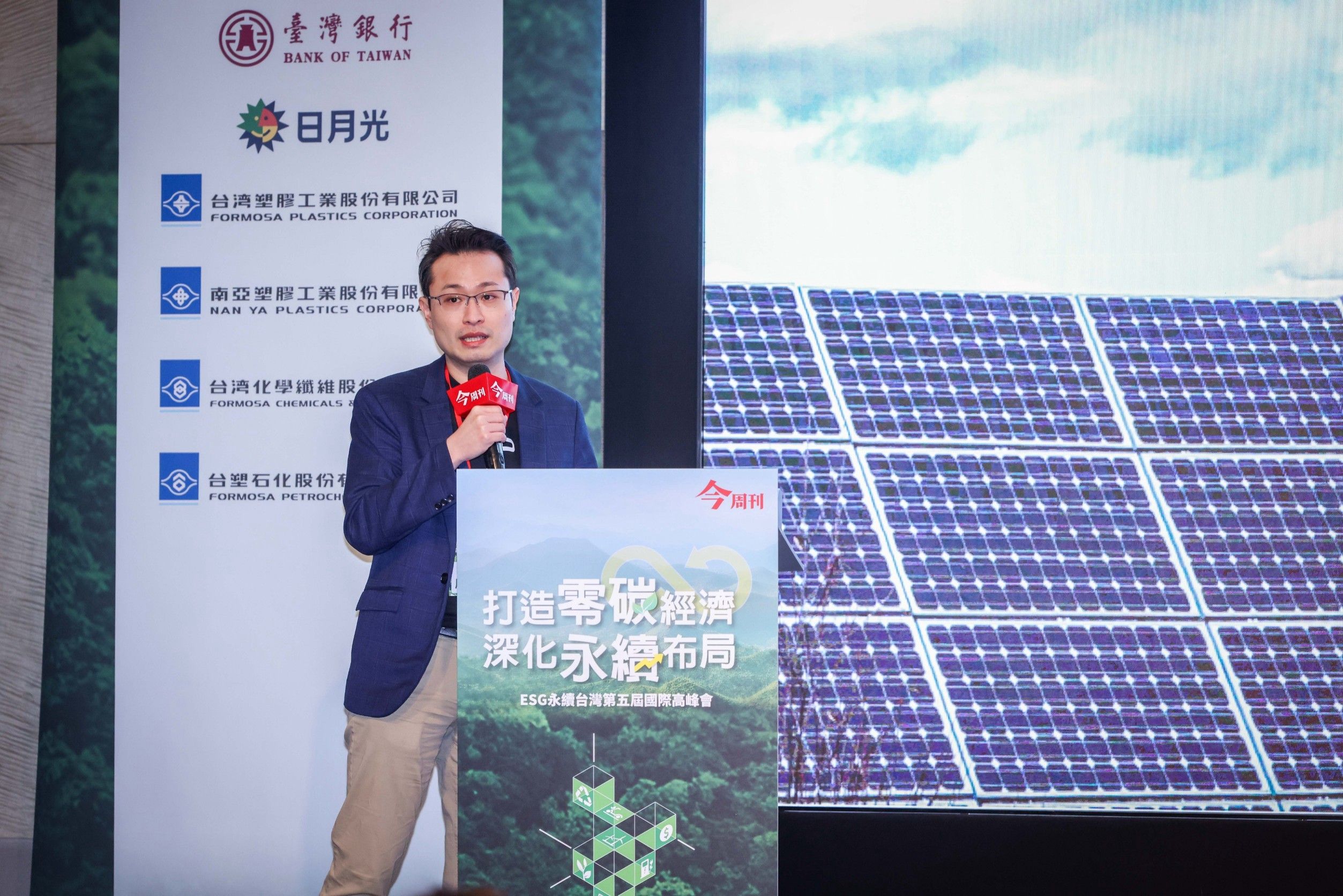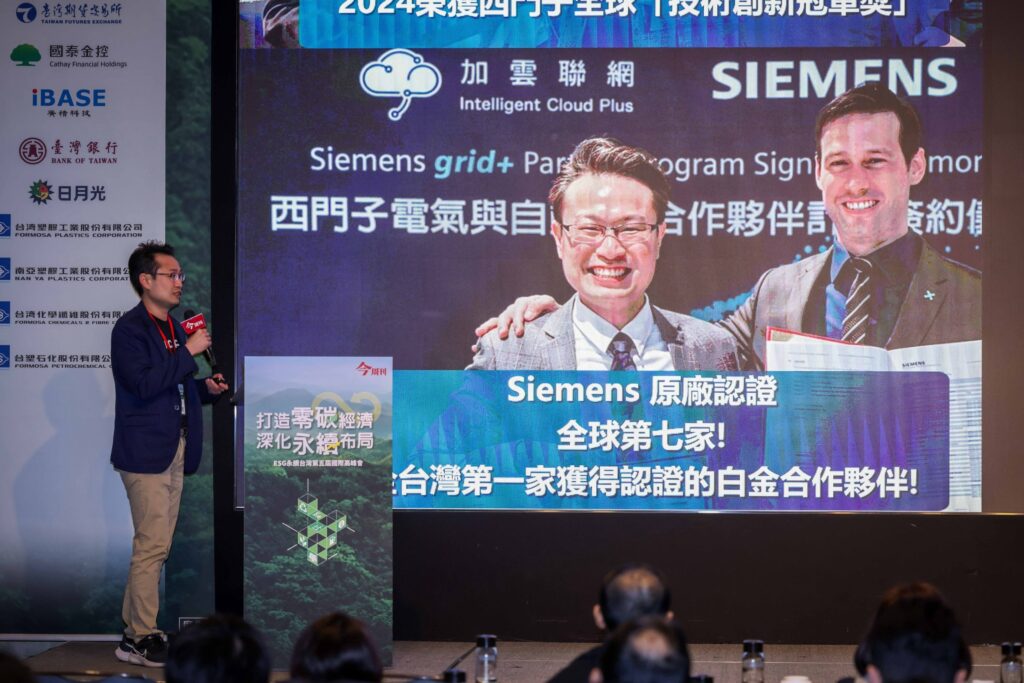
News
Updates
03.19
2025
ESG Sustainability Taiwan Summit: Exploring ESG Through Capital Markets, Local Revitalization, and Energy Transition — Why Sustainability Remains an Irreversible Trend?
來自:今周刊
首頁 / Updates / ESG Sustainability Taiwan Summit: Exploring ESG Through Capital Markets, Local Revitalization, and Energy Transition — Why Sustainability Remains an Irreversible Trend?
March 19, 2025 | From Business Today, written by Pei-Tzu Chu】

On March 19, 2025, Business Today hosted the 5th Annual ESG Sustainability Taiwan International Summit.The morning session, titled “Pursuing Net-Zero Ambitions: Collaboration Among Technology, Finance, and Cities,” featured keynote speeches by Taiwan Stock Exchange Chairman Lin Hsiu-Ming, Taiwan Regional Revitalization Foundation Chairperson Chen Mei-Ling, and Lawton Liao, General Manager of CloudTop Technologies.
Lin Hsiu-Ming addressed the global and domestic significance of ESG from the perspective of capital markets. He emphasized that despite shifts in international political dynamics, sustainable development remains an irreversible trend.
Chen Mei-Ling focused on urban-rural development and revitalizing local economies in Taiwan. She proposed various ways for businesses to engage in regional revitalization, including sourcing products from local teams, encouraging employee participation in experiential and volunteer activities, and establishing long-term strategic partnerships.
Lawton Liao highlighted the urgency of energy transition and analyzed the serious challenges traditional power grids face in accommodating intermittent renewable energy. He introduced next-generation grid technologies—digitalized, integrated, and intelligent—as well as the innovative iVPP. These solutions help enterprises manage energy, procure green electricity, and optimize energy storage, ultimately reducing operational costs and enhancing sustainable competitiveness.
Lin Hsiu-Ming: ESG Values May Fluctuate in the Short Term, but Sustainability Is a Long-Term Trend
Although major capital markets like the United States may experience short-term fluctuations in ESG values, Lin Hsiu-Ming believes that sustainable growth is a long-term trend that is unlikely to be challenged by political factors.
Under the policy guidance of the Financial Supervisory Commission, the Taiwan Stock Exchange (TWSE) actively plays a supportive role by providing resources and guidance to help listed companies implement ESG-related initiatives. The TWSE emphasizes that listed companies should take the lead in embedding sustainability into economic activities, daily life, and investment value.
Even though BlackRock, the world’s largest asset manager, has withdrawn from the Net Zero Asset Managers Initiative (NZAMI), it has stated that it will continue to assess and manage sustainable and transition investment strategies. Globally, ESG strategies are gaining importance and are increasingly aligning with the TCFD (Task Force on Climate-related Financial Disclosures) framework, which requires companies to disclose climate-related risks and opportunities across governance, strategy, risk management, and metrics and targets.

Chairman Lin Hsiu-Ming also shared that the ESG InfoHub showcases the performance and rankings of Taiwan’s listed companies on sustainability-related issues.
ESG InfoHub Enables Peer Benchmarking and Automated Sustainability Reporting
In the capital markets domain, the Taiwan Stock Exchange (TWSE) has mandated that all listed companies establish sustainability committees, disclose greenhouse gas inventories and assurance information, and participate in the newly established carbon credit exchange. Starting this year, all listed companies are required to submit sustainability reports—marking a new milestone in Taiwan’s sustainable development. TWSE is also promoting a Sustainability Disclosure Roadmap to align with international standards. In the future, companies will be expected to disclose Scope 1 and Scope 2 emissions alongside financial information, enhancing transparency and trust.
To provide strategic support and guidance, TWSE has identified sustainability and digitalization as its two core pillars for driving ecosystem growth. It has launched the ESG InfoHub, a platform that offers visualized ESG-related data for listed companies, making it easier for investors to access and compare information. Through this digital platform, companies can disclose relevant data, and investors can benchmark performance across companies and industries, thereby improving overall market performance.
Looking ahead, TWSE plans to leverage this data to offer a digital sustainability report generation platform, which will automatically produce reports based on company-submitted information. These sustainability reports will eventually be integrated into annual reports or financial statements, with AI-powered tools assisting in report generation and review—reducing the reporting burden on companies.
Additionally, Taiwan Index Plus Corporation, a TWSE subsidiary, has developed an Investor Relations (IR) Engagement Platform, which provides services for investor conferences and facilitates ESG information sharing and engagement. After a trial run in 2024, the full suite of services officially launched in June 2025. This platform helps institutional investors and listed companies engage in ESG-related dialogues, enhancing communication and supporting responsible investment and stewardship.
As of the end of February 2025, domestic investment trusts have launched several ESG-related funds, with assets growing by an impressive 1,626% over the past five years. This reflects the capital market’s growing emphasis on ESG and the active participation of investors. TWSE aims to meet investor demand through data transparency, encouraging listed companies to embrace ESG and increasing the visibility of small and medium-sized enterprises—collectively advancing Taiwan’s capital market.
Regional Revitalization Meets ESG: A New Opportunity for Corporate Sustainability
In their pursuit of ESG goals, many companies tend to focus on environmental protection and corporate governance, while often facing challenges in implementing the social (S) aspect—particularly in building deeper connections with local communities. Chen Mei-Ling, Chairperson of the Taiwan Regional Revitalization Foundation, emphasized that regional revitalization is not only a national initiative aimed at promoting balanced regional development in Taiwan, but also a crucial pathway for companies to fulfill ESG commitments and create sustainable value.
Taiwan faces serious urban-rural disparities and uneven development. Most of the population is concentrated in northern metropolitan areas, while rural regions are experiencing decline, with many homes left vacant. To address this, the Executive Yuan launched the Regional Revitalization Program during President Lai’s tenure as Premier. The program aims to stimulate local industries, boost economic vitality, attract people back to their hometowns, and achieve balanced national development.

Chen Mei-Ling explained that the core goal of regional revitalization is to foster economic self-sufficiency in local areas, attract younger generations to return home, and enable a better balance between work and life.
While Taiwan’s concept of regional revitalization draws inspiration from Japan, it must develop its own indigenous strategies. This includes adopting a bottom-up approach, fostering local identity, and promoting cross-sector collaboration among central and local governments, as well as public-private partnerships.
Chen stressed that companies should not pursue ESG merely for the sake of compliance or reporting. Instead, they should take concrete actions that bring real change to local communities. So, how can businesses implement ESG through regional revitalization? Chen offered several practical suggestions:
Procure Products and Services from Regional Revitalization Teams
Many young returnees and local teams are dedicated to developing products that reflect the unique characteristics of their regions, often incorporating sustainability principles. Examples include red quinoa grown using eco-friendly farming methods in Taitung, camellia oil extracted from native tea seeds in Yilan, and cultural and creative goods made from repurposed wood. By purchasing these products, companies can directly support local economies while demonstrating their commitment to sustainable development. Chen Mei-Ling also emphasized that procurement should be based on the value of the products, not out of sympathy.
Experience Regional Revitalization Firsthand
Encourage employees to participate in immersive regional revitalization activities—such as sustainable tourism in Heping Island, Keelung, farming experiences at Wang-Wang Sweet Potato Farm in Jinshan, and soybean cultivation and tofu-making workshops in Beidou, Changhua. Through these hands-on experiences, employees can gain a deeper understanding of local culture and industries, connect with the land, and internalize sustainability values as part of the corporate culture.
Establish Long-Term Strategic Partnerships with Regional Revitalization Teams
Companies should not treat collaboration with regional revitalization efforts as one-off activities. Instead, they should build long-term partnerships to jointly promote local development. For example, AUO has maintained a long-term procurement relationship with Rewood, a local team in Hukou that produces eco-friendly cleaning products based on the concept of forest circularity.
Businesses can also support these teams through investment or financing, or by organizing employee volunteer programs that contribute to regional revitalization—such as assisting with farming or participating in community-building projects.
Currently, the Taiwan Regional Revitalization Foundation platform features over 320 regional revitalization teams across all 22 counties and cities in Taiwan. Companies can easily find nearby partners and integrate ESG principles into local initiatives. Each team’s project is aligned with the UN Sustainable Development Goals (SDGs), allowing companies to clearly understand the impact of their contributions.
Chen Mei-Ling expressed her hope that by combining regional revitalization with ESG, Taiwan can gradually narrow the urban-rural gap, enabling people to live and thrive in their hometowns and achieving sustainable national development.
Integration and Transformation in the New Energy Era
Energy transition is no easy task. Traditional power systems struggle to accommodate distributed and intermittent renewable energy sources, and companies often face challenges such as rising costs and technological barriers in their pursuit of sustainability. Against this backdrop, CloudTop Technologies, leveraging its deep expertise and innovative technologies in grid transformation, is actively helping Taiwanese enterprises embrace the energy transition.
Lawton Liao shared that while technological advancement has brought prosperity and convenience, it may also be pushing us toward a sixth mass extinction. Energy transition is not as simple as replacing fossil fuels with solar panels.

He emphasized that traditional grid management methods are no longer suitable for handling large volumes of uncontrollable power sources. Therefore, it is essential to digitize, integrate, and intelligently upgrade the power grid to meet the demands of the new energy era.Photo by Hsiao Peng-Kai
Digitalizing Traditional Substations
With the rise of industrial development, AI applications, the booming semiconductor industry, and the growing demand from electric vehicles and data centers, global electricity consumption continues to surge. Simply changing the method of power generation is no longer sufficient—what’s needed is a comprehensive transformation of the existing power grid.
Traditional power grids are centralized and one-directional. In the past, Taiwan could meet its electricity needs with just around 20 power plants. However, with the increasing integration of renewable energy sources like solar and wind, the future may require over 100,000 small and large-scale power generation sites. These renewable sources are unstable, intermittent, and difficult to control—akin to managing “100,000 unruly children.” To address this, a new generation of power grids must be built using digitalization, integration, and intelligence.
Lawton Liao pointed out that the first step in grid transformation is digitalization—leveraging internet technologies to collect data from all nodes of the power system, including generation, transmission, distribution, and consumption. The second step is integration, enabling seamless communication between nodes so that electricity can flow freely across the grid. The final step is intelligence, using the collected data to make optimal decisions and ensure efficient grid operation.
In recent years, ICP has supported Taiwan Power Company (Taipower) in the design and implementation of 33 smart substations. Additionally, in the offshore wind sector, CloudTop Technologies—as a leading ICP enterprise—is the only local company in Taiwan capable of integrating all complex systems, including onshore substations, central control systems, and cybersecurity infrastructure.

ICP has established strategic partnerships with global industry leaders such as Siemens, and was honored as the first-ever recipient of the “Tech Innovation Champion Award” presented by Siemens headquarters in Germany.Photo by Hsiao Peng-Kai
Positioning itself as an “Integration Expert in the New Energy Era,” ICP is dedicated to helping enterprises overcome the challenges of sustainable transformation.
To address corporate sustainability needs, CloudTop Technologies—as a key player in the ICP ecosystem—launched the iVPP (Intelligent Virtual Power Plant) cloud platform. This solution integrates ICP’s extensive experience in large-scale infrastructure projects, including offshore wind power, solar photovoltaics, and electric vehicles.
By adopting the iVPP platform, companies can reduce electricity costs by over 20% annually while enhancing their carbon management performance—demonstrating that technology can deliver both sustainability and economic value.
Through its smart grid solutions and the innovative iVPP platform, ICP empowers enterprises to move forward confidently on the path toward a greener future, embracing a more sustainable and prosperous era together.